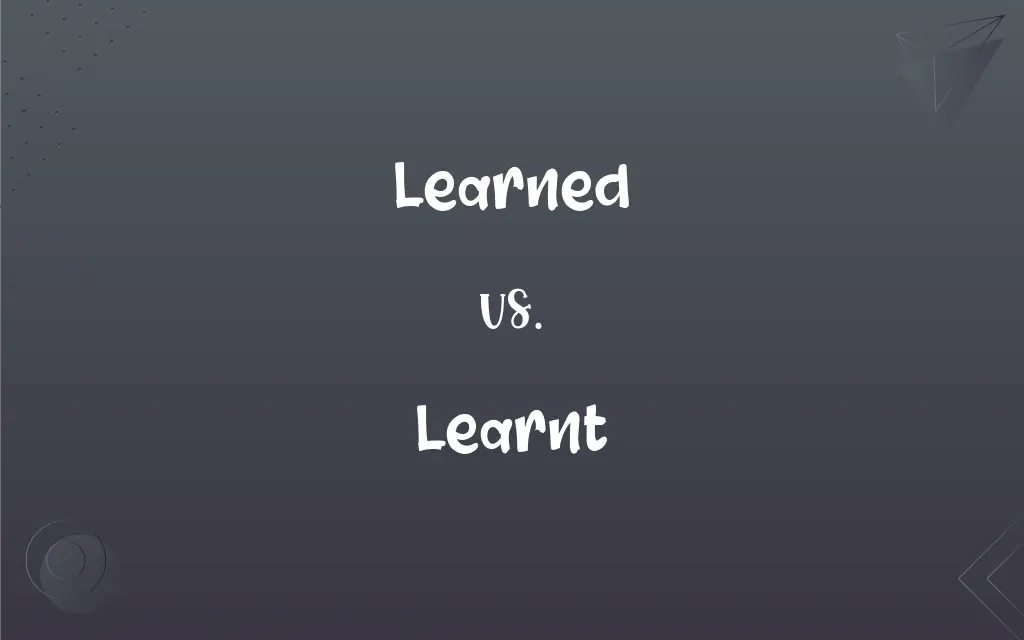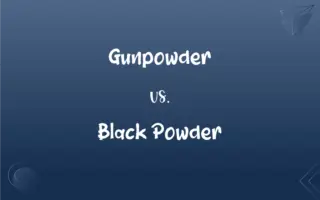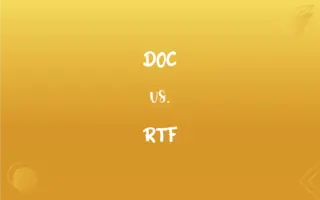Learned vs. Learnt: What's the Difference?
Edited by Janet White || By Harlon Moss || Published on October 15, 2024
"Learned" and "Learnt" both mean having acquired knowledge or skills, but "learned" is more common in American English, while "learnt" is more common in British English.

Key Differences
"Learned" is the preferred past tense and past participle form of "learn" in American English. On the other hand, "Learnt" is commonly used in British English, serving the same grammatical function.
"Learned" and "Learnt" are pronounced similarly, their spelling differs, reflecting the variations in American and British English. "Learned" ends with "ed," typical in American English, whereas "Learnt" uses "t," which is a common British English pattern for past tense verbs.
In formal writing, especially in American English, "learned" is often the standard form used. However, "Learnt" is equally acceptable in British English and is used interchangeably with "learned" in both formal and informal contexts.
It's important for writers to be consistent with their use of "Learned" or "Learnt," depending on their preferred variety of English. Mixing American and British forms can lead to inconsistency in writing.
Both "Learned" and "Learnt" are correct, some English speakers may perceive "Learnt" as less formal or less standard, especially in American English. However, both forms are grammatically correct and widely understood.
ADVERTISEMENT
Comparison Chart
Preferred in
American English
British English
Spelling Variation
Ends with "ed"
Ends with "t"
Pronunciation
Same as Learnt
Same as Learned
Formality
Standard in formal American English
Acceptable in formal British English
Consistency
Used consistently in American texts
Used consistently in British texts
ADVERTISEMENT
Learned and Learnt Definitions
Learned
"Learned" serves as the past tense of "learn."
He learned to play the piano as a child.
Learnt
"Learnt" means having acquired knowledge or skill.
She learnt French while living in Paris.
Learned
"Learned" is used to describe the act of gaining information.
She learned about the civil war in her history class.
Learnt
"Learnt" is used to describe the process of gaining information.
He had just learnt about the company's new policy.
Learned
"Learned" can also imply having become informed or enlightened.
They learned of the decision only yesterday.
Learnt
"Learnt" implies becoming informed or educated on a subject.
They learnt of the event through a newsletter.
Learned
"Learned" means having acquired knowledge or skill in something.
He learned the rules of the game quickly.
Learnt
"Learnt" is used as a past participle in perfect tenses in British English.
She has learnt several musical instruments.
Learned
"Learned" is used as a past participle in perfect tenses.
She has learned many languages.
Learnt
"Learnt" serves as the past tense of "learn" in British English.
He quickly learnt the local customs.
Learned
Having profound, often systematic knowledge; erudite.
Learnt
A past tense and a past participle of learn.
Learnt
Past participle of learn
She has learnt to adapt to the changes quickly.
FAQs
Is "learned" the same as "learnt"?
Yes, "learned" and "learnt" have the same meaning but differ in regional usage.
Do "learned" and "learnt" have different pronunciations?
No, they are generally pronounced the same.
Are there any spelling rules for choosing between "learned" and "learnt"?
The choice is primarily based on regional language norms, not specific spelling rules.
In which English-speaking countries is "learnt" more common?
"Learnt" is more common in the UK, Australia, and other Commonwealth countries.
Is "learnt" widely used in British English?
Yes, "learnt" is commonly used in British English.
Can "learned" and "learnt" be used interchangeably?
They can be used interchangeably, but it's best to stick to one form based on the variety of English you are using.
Is "learnt" acceptable in American English?
"Learnt" is less common in American English but is understood and occasionally used.
Is "learned" considered more formal than "learnt"?
In American English, "learned" is often considered more standard, especially in formal writing.
Can "learnt" be used in past perfect tense?
Yes, "learnt" can be used in past perfect tense in British English.
Are there any exceptions to using "learned" or "learnt"?
There are no exceptions; the choice depends on regional preference.
Which form should I use in academic writing in the UK?
Both "learned" and "learnt" are acceptable in UK academic writing.
Do "learned" and "learnt" have different connotations?
They do not have different connotations and are viewed as stylistic variations.
Should I avoid using "learnt" in American publications?
It's advisable to use "learned" in American publications for consistency.
Is "learned" ever pronounced differently?
"Learned" can be pronounced with two syllables ("learn-ed") when used as an adjective meaning knowledgeable.
Is it important to be consistent with "learned" and "learnt" in writing?
Consistency in using either "learned" or "learnt" in a document is important for stylistic uniformity.
Are "learned" and "learnt" used in passive forms?
Yes, both can be used in passive forms, depending on the variety of English.
Is the use of "learnt" increasing in American English?
The use of "learnt" in American English is not significantly increasing and remains less common.
How do English learners decide whether to use "learned" or "learnt"?
English learners should consider the regional form of English they are studying or using.
Can "learned" be used as an adjective?
Yes, "learned" can also be an adjective, meaning having much knowledge; scholarly.
Does the meaning of "learned" change when used in different tenses?
No, the meaning of "learned" remains the same across different tenses.
About Author
Written by
Harlon MossHarlon is a seasoned quality moderator and accomplished content writer for Difference Wiki. An alumnus of the prestigious University of California, he earned his degree in Computer Science. Leveraging his academic background, Harlon brings a meticulous and informed perspective to his work, ensuring content accuracy and excellence.
Edited by
Janet WhiteJanet White has been an esteemed writer and blogger for Difference Wiki. Holding a Master's degree in Science and Medical Journalism from the prestigious Boston University, she has consistently demonstrated her expertise and passion for her field. When she's not immersed in her work, Janet relishes her time exercising, delving into a good book, and cherishing moments with friends and family.






































































